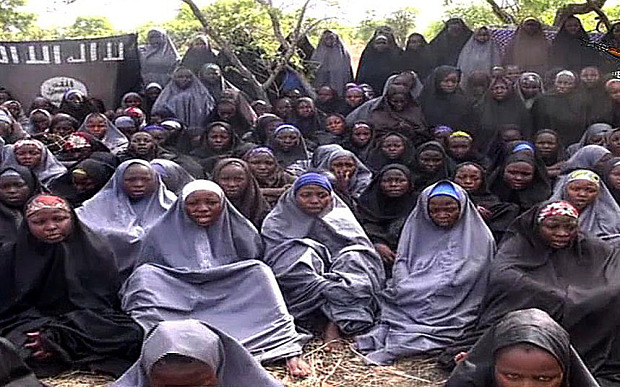Three mothers of the school girls abducted from Chibok in northeast Nigeria two years ago said they could identify their daughters in the latest video released by Islamist group, Boko Haram, the first possible sighting of the girls since a video in May 2014.
About 15 girls featured in the video released to local officials on Tuesday, saying they were from the Government Girls Secondary School in Chibok and pleading with the Nigerian government to cooperate with Boko Haram on their release.
The girls were filmed saying they were being treated well, but wanted to go home and be with their families.
Boko Haram militants abducted 276 school girls from Chibok exactly two years today, with 57 students managing to escape, but 219 were still missing despite a global campaign #bringbackourgirls that involved celebrities and U.S. first lady Michelle Obama.
Various false leads have raised hopes of finding the girls, but their whereabouts remained unknown.
Mothers Rifkatu Ayuba and Mary Ishaya said, they recognised their daughters, Saratu and Hauwa, in the video, while a third mother, Yana Galang, identified five of the missing girls. Local officials said more identifications were needed.
“The girls were looking very, very well,” Galang said in a telephone interview after viewing the video at a screening organised by local officials in Maiduguri, capital of Borno state in northeast Nigeria.
The three mothers were invited to the viewing by the chairman of Chibok local government area, Bana Lawan, who confirmed that he had paid their travel costs to Maiduguri, the state capital.
The kidnapping of the girls has become a political issue in Nigeria with the government and military criticised for their handling of the incident and failing to track down the girls.
“They were definitely our daughters … all we want is for the government to bring back our girls,” said Galang, adding all the girls were wearing hijabs ( veils ) in the video.
No member of Boko Haram was visible in the video and local officials were not immediately available to give details on how they received the video.
“We only heard a man’s voice and saw his finger pointing at the girls one after the other,” Galang said.
She said the girls in the video spoke in Hausa, a language widely spoken in Nigeria, and Kibaku, the local Chibok language.
Galang said one mother, Ayuba, was relieved to see her daughter as she had heard a rumour shortly after the ugly incident that her daughter had been killed by Boko Haram.
“She was very happy to see her in the video … her daughter is alive,” Galang said.













